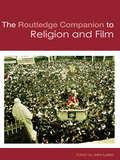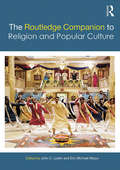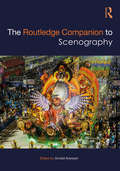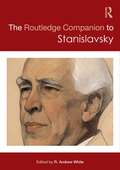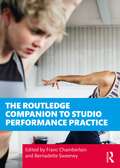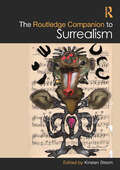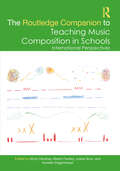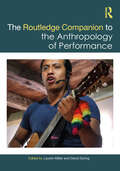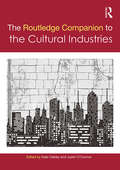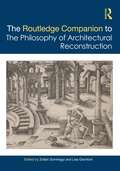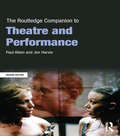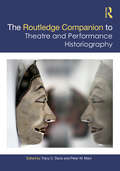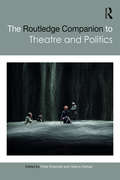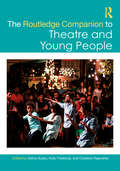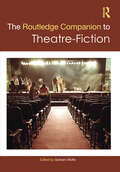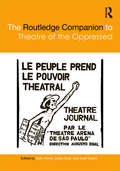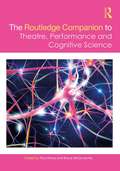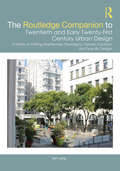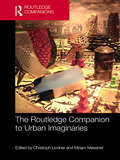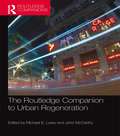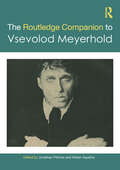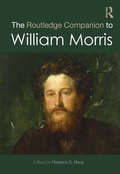- Table View
- List View
The Routledge Companion to Religion and Film (Routledge Religion Companions)
by John LydenThe Routledge Companion to Religion and Film brings together a lively and experienced team of contributors to introduce students to the key topics in religion and film and to investigate the ways in which the exciting subject of religion and film is developing for more experienced scholars. Divided into four parts, the Companion: analyzes the history of the interaction of religion and film, through periods of censorship as well as appreciation of the medium studies religion-in-film, examining how the world’s major religions, as well as Postcolonial, Japanese and New Religions, are depicted by and within films uses diverse methodologies to explore religion and film, such as psychoanalytical, theological and feminist approaches, and audience reception analyzes religious themes in film, including Redemption, the Demonic, Jesus or Christ Figures, Heroes and Superheroes considers films as diverse as The Passion of the Christ, The Matrix, Star Wars and Groundhog Day. This definitive book provides an accessible resource to this emerging field and is an indispensable guide to religion and film for students of Religion, Film Studies, and beyond.
The Routledge Companion to Religion and Popular Culture (Routledge Religion Companions)
by John C. Lyden Eric Michael MazurReligion and popular culture is a fast-growing field that spans a variety of disciplines. This volume offers the first real survey of the field to date and provides a guide for the work of future scholars. It explores: key issues of definition and of methodology religious encounters with popular culture across media, material culture and space, ranging from videogames and social networks to cooking and kitsch, architecture and national monuments representations of religious traditions in the media and popular culture, including important non-Western spheres such as Bollywood This Companion will serve as an enjoyable and informative resource for students and a stimulus to future scholarly work.
The Routledge Companion to Scenography (Routledge Companions)
by Arnold AronsonThe Routledge Companion to Scenography is the largest and most comprehensive collection of original essays to survey the historical, conceptual, critical and theoretical aspects of this increasingly important aspect of theatre and performance studies. Editor and leading scholar Arnold Aronson brings together a uniquely valuable anthology of texts especially commissioned from across the discipline of theatre and performance studies. Establishing a stable terminology for a deeply contested term for the first time, this volume looks at scenography as the totality of all the visual, spatial and sensory aspects of performance. Tracing a line from Aristotle’s Poetics down to Brecht and Artaud and into contemporary immersive theatre and digital media, The Routledge Companion to Scenography is a vital addition to every theatre library.
The Routledge Companion to Stanislavsky (Routledge Companions Ser.)
by R. Andrew WhiteStanislavsky’s system of actor-training has revolutionised modern theatre practice, and he is widely recognised to be one of the great cultural innovators of the twentieth century. The Routledge Companion to Stanislavsky is an essential book for students and scholars alike, providing the first overview of the field for the 21st century. An important feature of this book is the balance between Stanislavsky’s theory and practice, as international contributors present scholarly and artistic interpretations of his work. With chapters including academic essays and personal narratives, the Companion is divided into four clear parts, exploring Stanislavsky on stage, as an acting teacher, as a theorist and finally as a theatre practitioner. Bringing together a dazzling selection of original scholarship, notable contributions include:Anatoly Smeliansky on Stanislavsky’s lettersWilliam D. Gunn on staging ideology at the Moscow Art TheatreSharon Marie Carnicke and David Rosen on opera Rosemary Malague on the feminist perspective of new translationsW.B. Worthen on cognitive scienceJulia Listengarten on the avant-gardeDavid Krasner on the System in America and Dennis Beck on Stanislavsky’s legacy in non-realistic theatre R. Andrew White is Associate Professor of Theatre at Valparaiso University, where he annually directs productions. He has an MFA in Acting from Carnegie Mellon University and the Moscow Art Theatre School, and has worked as an actor at a variety of theatres in the United States. In addition, his scholarship has appeared in edited works published by Routledge and Palgrave Macmillan, as well as in top American journals including Theatre Survey, TDR/The Drama Review, and New England Theatre Journal.
The Routledge Companion to Studio Performance Practice
by Franc ChamberlainThe Routledge Companion to Studio Performance Practice is a unique, indispensable guide to the training methods of the world’s key theatre practitioners. Compiling the practical work outlined in the popular Routledge Performance Practitioners series of guidebooks, each set of exercises has been edited and contextualised by an expert in that particular approach. Each chapter provides a taster of one practitioner’s work, answering the same key questions: ‘How did this artist work? How can I begin to put my understanding of this to practical use?’ Newly written chapter introductions put the exercises in context, explaining how they fit into the wider methods and philosophy of the practitioner in question. All 21 volumes in the original series are represented in this volume.
The Routledge Companion to Surrealism (Routledge Art History and Visual Studies Companions)
by Kirsten StromThis book provides a conceptual and global overview of the field of Surrealist studies. Methodologically, the companion considers Surrealism’s many achievements, but also its historical shortcomings, to illuminate its connections to the historical and cultural moment(s) from which it originated and to assess both the ways in which it still shapes our world in inspiring ways and the ways in which it might appear problematic as we look back at it from a twenty-first-century vantage point. Contributions from experienced scholars will enable professors to teach the subject more broadly, by opening their eyes to aspects of the field that are on the margins of their expertise, and it will enable scholars to identify new areas of study in their own work, by indicating lines of research at a tangent to their own. The companion will reflect the interdisciplinarity of Surrealism by incorporating discussions pertaining to the visual arts, as well as literature, film, and political and intellectual history.
The Routledge Companion to Teaching Music Composition in Schools: International Perspectives (Routledge Music Companions)
by Kirsty Devaney Martin Fautley Joana Grow Annette ZiegenmeyerThe Routledge Companion to Teaching Music Composition in Schools: International Perspectives offers a comprehensive overview of teaching composing from a wide range of countries around the world. Addressing the current state of composition pedagogy from primary to secondary school levels and beyond, the volume explores issues, including different curricular and extracurricular settings, cultural aspects of composing, aesthetics, musical creativity, the role of technology, and assessment. With contributors from over 30 countries, this volume encompasses theoretical, historical, empirical, and practical approaches and enables comparisons across different countries and regions. Chapters by experienced educators, composers, and researchers describe in depth the practices taking place in different international locations. Interspersed with these chapters, interludes by the volume editors contextualize and problematize the teaching and learning of composing music. The volume covers a range of contexts, including formal and informal, those where a national curriculum is mandated or where composing is a matter of choice, and a range of types, styles, and genres of musical learning and music-making. Providing a wide-ranging and detailed review of international approaches to incorporating music composition in teaching and learning, this volume will be a useful resource for teachers, music education researchers, graduate and undergraduate students, and all those working with children and young people in composing music.
The Routledge Companion to the Anthropology of Performance (Routledge Companions)
by Lauren Miller David SyringThe Routledge Companion to the Anthropology of Performance provides a cutting-edge, comprehensive overview of the foundations, epistemologies, methodologies, key topics and current debates, and future directions in the field. It brings together work from the disciplines of anthropology and performance studies, as well as adjacent fields. Across 31 chapters, a diverse range of international scholars cover topics including: - Ritual - Theater - Storytelling - Music - Dance - Textiles - Land Acknowledgments - Indigenous Identity - Visual Arts - Embodiment - Cognition - Healing - Festivals - Politics - Activism - The Law - Race and Ethnicity - Gender and Sexuality - Class - Religion, Spirituality, and Faith - Disability - Leisure, Gaming, and Sport. In addition, the included Appendix offers tools, exercises, and activities designed by contributors as useful suggestions to readers, both within and beyond academic contexts, to take the insights of performance anthropology into their work. This is a valuable reference for scholars and upper-level students in anthropology, performance studies, and related disciplines, including religious studies, art, philosophy, history, political science, gender studies, and education.
The Routledge Companion to the Anthropology of Performance (Routledge Companions)
by Lauren Miller David SyringThe Routledge Companion to the Anthropology of Performance provides a cutting-edge, comprehensive overview of the foundations, epistemologies, methodologies, key topics and current debates, and future directions in the field. It brings together work from the disciplines of anthropology and performance studies, as well as adjacent fields. Across 31 chapters, a diverse range of international scholars cover topics including: Ritual Theater Storytelling Music Dance Textiles Land Acknowledgments Indigenous Identity Visual Arts Embodiment Cognition Healing Festivals Politics Activism The Law Race and Ethnicity Gender and Sexuality Class Religion, Spirituality, and Faith Disability Leisure, Gaming, and Sport In addition, the included Appendix offers tools, exercises, and activities designed by contributors as useful suggestions to readers, both within and beyond academic contexts, to take the insights of performance anthropology into their work. This is a valuable reference for scholars and upper-level students in anthropology, performance studies, and related disciplines, including religious studies, art, philosophy, history, political science, gender studies, and education.
The Routledge Companion to the Cultural Industries (Routledge Media and Cultural Studies Companions)
by Kate Oakley Justin O'ConnorThe Routledge Companion to the Cultural Industries is collection of contemporary scholarship on the cultural industries and seeks to re-assert the importance of cultural production and consumption against the purely economic imperatives of the ‘creative industries’. Across 43 chapters drawn from a wide range of geographic and disciplinary perspectives, this comprehensive volume offers a critical and empirically-informed examination of the contemporary cultural industries. A range of cultural industries are explored, from videogames to art galleries, all the time focussing on the culture that is being produced and its wider symbolic and socio-cultural meaning. Individual chapters consider their industrial structure, the policy that governs them, their geography, the labour that produces them, and the meaning they offer to consumers and participants. The collection also explores the historical dimension of cultural industry debates providing context for new readers, as well as critical orientation for those more familiar with the subject. Questions of industry structure, labour, place, international development, consumption and regulation are all explored in terms of their historical trajectory and potential future direction. By assessing the current challenges facing the cultural industries this collection of contemporary scholarship provides students and researchers with an essential guide to key ideas, issues, concepts and debates in the field.
The Routledge Companion to the Philosophy of Architectural Reconstruction
by Lisa Giombini Zoltán SomhegyiThis companion investigates the philosophical and theoretical foundations determining the conditions of possibility and the limits that make the conservation, readaptation, and transformation of past buildings legitimate operations.As increasing ecological and economic challenges question opportunities for new construction, the process of restoring, transforming, and readapting buildings for new or continued use is becoming an essential part of architectural practice. At the same time, the role of building conservation is changing from mere material preservation to being part of a broader strategy for social regeneration, eco-awareness, and inclusive urban planning. Chapters of this volume explore the complex set of considerations that inform decisions to merely preserve, accurately restore or variously reuse a building. They also look at the broader philosophical concerns such as ethical and aesthetic values, combined with ideas of heritage, history, and collective identity. Case studies on reconstruction after war, gentrification, the restoration of ancient edifices, reconstruction following the effects of climate change, and the use of technology solutions among many others, make this a timely and urgent volume.Adopting a broad transcultural perspective with contributions from five continents, the volume combines theoretical approaches with more practical, case study-based investigations and will be of great interest to upper-level students and academics working in the fields of architecture, conservation, urban design, aesthetics, and heritage management.
The Routledge Companion to Theatre and Performance (Routledge Companions)
by Paul Allain Jen HarvieWhat is theatre? What is performance? What connects them and how are they different? What events, people, practices and ideas have shaped theatre and performance in the twentieth and twenty-first century? The Routledge Companion to Theatre and Performance offers some answers to these big questions. It provides an analytical, informative and engaging introduction to important people, companies, events, concepts and practices that have defined the complementary fields of theatre and performance studies. This fully updated second edition contains three easy to use alphabetized sections including over 120 revised entries on topics and people ranging from performance artist Ron Athey, to directors Vsevold Meyerhold and Robert Wilson, megamusicals , postdramatic theatre and documentation. Each entry includes crucial historical and contextual information, extensive cross-referencing, detailed analysis and an annotated bibliography. The Routledge Companion to Theatre and Performance is a perfect reference guide for the keen student.
The Routledge Companion to Theatre and Performance Historiography (Routledge Companions)
by Tracy C. DavisThe Routledge Companion to Theatre and Performance Historiography sets the agenda for inclusive and wide-ranging approaches to writing history, embracing the diverse perspectives of the twenty-first century and Critical Media History. Written by an international team of authors whose expertise spans a multitude of historical periods and cultures, this collection of fascinating essays poses the central question: "what is specific to the historiography of the performative?" The study of theatre, in conjunction with the wider sphere of performance, involves an array of multi-faceted methods for collecting evidence, interpreting sources, and creating meaning. Reflecting on issues of recording — from early modern musical scores, through VHS-technology to latest digital procedures — and on what is missing from records or oblique in practices, the contributors convey how theatre and performance history is integral to social and cultural relations. This expertly curated collection repositions theatre and performance history and is essential reading for Theatre and Performance Studies students or those interested in social and cultural history more generally.
The Routledge Companion to Theatre and Politics (Routledge Companions)
by Peter Eckersall Helena GrehanThe Routledge Companion to Theatre and Politics is a volume of critical essays, provocations, and interventions on the most important questions faced by today’s writers, critics, audiences, and theatre and performance makers. Featuring texts written by scholars and artists who are diversely situated (geographically, culturally, politically, and institutionally), its multiple perspectives broadly address the question "How can we be political now?" To respond to this question, Peter Eckersall and Helena Grehan have created eight galvanising themes as frameworks or rubrics to rethink the critical, creative, and activist perspectives on questions of politics and theatre. Each theme is linked to a set of guiding keywords: Post (post consensus, post-Brexit, post-Fukushima, post-neoliberalism, post-humanism, post-global financial crisis, post-acting, the real) Assembly (assemblage, disappearance, permission, community, citizen, protest, refugee) Gap (who is in and out, what can be seen/heard/funded/allowed) Institution (visibility/darkness, inclusion, rules) Machine (biodata, surveillance economy, mediatisation) Message (performance and conviction, didacticism, propaganda) End (suffering, stasis, collapse, entropy) Re. (reset, rescale, reanimate, reimagine, replay: how to bring complexity back into the public arena, how art can help to do this). These themes were developed in conversation with key thinkers and artists in the field, and the resulting texts engage with artistic works across a range of modes including traditional theatre, contemporary performance, public protest events, activism, and community and participatory theatre. Suitable for academics, performance makers, and students, The Routledge Companion to Theatre and Politics explores questions of how to be political in the early 21st century, by exploring how theatre and performance might provoke, unsettle, reinforce, or productively destabilise the status quo.
The Routledge Companion to Theatre and Young People (Routledge Companions)
by Selina Busby Kelly Freebody Charlene RajendranThis companion interrogates the relationship between theatre and youth from a global perspective, taking in performances and theatre made by, for, and about young people. These different but interrelated forms of theatre are addressed through four critical themes that underpin the ways in which analysis of contemporary theatre in relation to young people can be framed: political utterances – exploring the varied ways theatre becomes a platform for political utterance as a process of dialogic thinking and critical imagining; critical positioning – examining youth theatre work that navigates the sensitive, dynamic, and complex terrains in which young people live and perform; pedagogic frames – outlining a range of contexts and programmes in which young people learn to make and understand theatre that reflects their artistic capacities and aesthetic strategies; applying performance – discussing a range of projects and companies whose work has been influential in the development of youth theatre within specific contexts. Providing critical, research-informed, and research-based discussions on the intersection between young people, their representation, and their participation in theatre, this is a landmark text for students, scholars, and practitioners whose work and thinking involves theatre and young people.
The Routledge Companion to Theatre-Fiction (Routledge Literature Handbooks)
by Graham WolfeNovelists have long been attracted to theatre. Some have pursued success on the stage, but many have sought to combine these worlds, entering theatre through their fiction, setting stages on their novels’ pages, and casting actors, directors, and playwrights as their protagonists. The Routledge Companion to Theatre-Fiction has convened an international community of scholars to explore the remarkable array of novelists from many eras and parts of the world who have created fiction from the stuff of theatre, asking what happens to theatre on the pages of novels, and what happens to novels when they collaborate with theatre. From J. W. Goethe to Louisa May Alcott, Mikhail Bulgakov, Virginia Woolf, and Margaret Atwood, some of history’s most influential novelists have written theatre-fiction, and this Companion discusses many of these figures from new angles. But it also spotlights writers who have received less critical attention, such as Dorothy Leighton, Agustín de Rojas Villandrando, Ronald Firbank, Syed Mustafa Siraj, Li Yu, and Vicente Blasco Ibañez, bringing their work into conversation with a vital field. A valuable resource for students, scholars, and admirers of both theatre and novels, The Routledge Companion to Theatre-Fiction offers a wealth of new perspectives on topics of increasing critical concern, including intermediality, theatricality, antitheatricality, mimesis, diegesis, and performativity.
The Routledge Companion to Theatre-Fiction (Routledge Literature Handbooks)
by Graham WolfeNovelists have long been attracted to theatre. Some have pursued success on the stage, but many have sought to combine these worlds, entering theatre through their fiction, setting stages on their novels’ pages, and casting actors, directors, and playwrights as their protagonists. The Routledge Companion to Theatre-Fiction has convened an international community of scholars to explore the remarkable array of novelists from many eras and parts of the world who have created fiction from the stuff of theatre, asking what happens to theatre on the pages of novels, and what happens to novels when they collaborate with theatre. From J. W. Goethe to Louisa May Alcott, Mikhail Bulgakov, Virginia Woolf, and Margaret Atwood, some of history’s most influential novelists have written theatre-fiction, and this Companion discusses many of these figures from new angles. But it also spotlights writers who have received less critical attention, such as Dorothy Leighton, Agustín de Rojas Villandrando, Ronald Firbank, Syed Mustafa Siraj, Li Yu, and Vicente Blasco Ibañez, bringing their work into conversation with a vital field. A valuable resource for students, scholars, and admirers of both theatre and novels, The Routledge Companion to Theatre-Fiction offers a wealth of new perspectives on topics of increasing critical concern, including intermediality, theatricality, antitheatricality, mimesis, diegesis, and performativity.
The Routledge Companion to Theatre of the Oppressed (Routledge Companions)
by Kelly Howe Julian Boal José SoeiroThis dynamic book offers a comprehensive companion to the theory and practice of Theatre of the Oppressed. Developed by Brazilian director and theorist Augusto Boal, these theatrical forms invite people to mobilize their knowledge and rehearse struggles against oppression. Featuring a diverse array of voices (many of them as yet unheard in the academic world), the book hosts dialogues on the following questions, among others: Why and how did Theatre of the Oppressed develop? What are the differences between the 1970s (when Theatre of the Oppressed began) and today? How has Theatre of the Oppressed been shaped by local and global shifts of the last 40-plus years? Why has Theatre of the Oppressed spread or "multiplied" across so many geographic, national, and cultural borders? How has Theatre of the Oppressed been shaped by globalization, "development," and neoliberalism? What are the stakes, challenges, and possibilities of Theatre of the Oppressed today? How can Theatre of the Oppressed balance practical analysis of what is with ambitious insistence on what could be? How can Theatre of the Oppressed hope, but concretely? Broad in scope yet rich in detail, The Routledge Companion to Theatre of the Oppressed contains practical and critical content relevant to artists, activists, teachers, students, and researchers.
The Routledge Companion to Theatre, Performance and Cognitive Science (Routledge Companions)
by Rick Kemp Bruce McConachieThe Routledge Companion to Theatre, Performance and Cognitive Science integrates key findings from the cognitive sciences (cognitive psychology, neuroscience, evolutionary studies and relevant social sciences) with insights from theatre and performance studies. This rapidly expanding interdisciplinary field dynamically advances critical and theoretical knowledge, as well as driving innovation in practice. The anthology includes 30 specially commissioned chapters, many written by authors who have been at the cutting-edge of research and practice in the field over the last 15 years. These authors offer many empirical answers to four significant questions: How can performances in theatre, dance and other media achieve more emotional and social impact? How can we become more adept teachers and learners of performance both within and outside of classrooms? What can the cognitive sciences reveal about the nature of drama and human nature in general? How can knowledge transfer, from a synthesis of science and performance, assist professionals such as nurses, care-givers, therapists and emergency workers in their jobs? A wide-ranging and authoritative guide, The Routledge Companion to Theatre, Performance and Cognitive Science is an accessible tool for not only students, but practitioners and researchers in the arts and sciences as well.
The Routledge Companion to Twentieth and Early Twenty-First Century Urban Design: A History of Shifting Manifestoes, Paradigms, Generic Solutions, and Specific Designs (Routledge Companions)
by Jon LangThe Routledge Companion to Twentieth and Early Twenty-First Century Urban Design is a fully illustrated descriptive and explanatory history of the development of urban design ideas and paradigms of the past 150 years. The ideas and projects, hypothetical and built, range in scale from the city to the urban block level. The focus is on where the generic ideas originated, the projects that were designed following their precepts, the functions they address and/or afford, and what we can learn from them. The morphology of a city—its built environment—evolves unselfconsciously as private and governmental investors self-consciously erect buildings and infrastructure in a pragmatic, piecemeal manner to meet their own ends. Philosophers, novelists, architects, and social scientists have produced myriad ideas about the nature of the built environment that they consider to be superior to those forms resulting from a laissez-faire attitude to urban development. Rationalist theorists dream of ideal futures based on assumptions about what is good; empiricists draw inspirations from what they perceive to be working well in existing situations. Both groups have presented their advocacies in manifestoes and often in the form of generic solutions or illustrative designs. This book traces the history of these ideas and will become a standard reference for scholars and students interested in the history of urban spaces, including architects, planners, urban historians, urban geographers, and urban morphologists.
The Routledge Companion to Urban Imaginaries (Routledge International Handbooks)
by Christoph Lindner Miriam MeissnerThe Routledge Companion to Urban Imaginaries delves into examples of urban imaginaries across multiple media and geographies: from new visions of smart, eco, and resilient cities to urban dystopias in popular culture; from architectural renderings of starchitecture and luxury living to performative activism for new spatial justice; and from speculative experiments in urban planning, fiction, and photography to augmented urban realities in crowd-mapping and mobile apps. The volume brings various global perspectives together and into close dialogue to offer a broad, interdisciplinary, and critical overview of the current state of research on urban imaginaries. Questioning the politics of urban imagination, the companion gives particular attention to the role that urban imaginaries play in shaping the future of urban societies, communities, and built environments. Throughout the companion, issues of power, resistance, and uneven geographical development remain central. Adopting a transnational perspective, the volume challenges research on urban imaginaries from the perspective of globalization and postcolonial studies, inviting critical reconsiderations of urbanism in its diverse current forms and definitions. In the process, the companion explores issues of Western-centrism in urban research and design, and accommodates current attempts to radically rethink urban form and experience. This is an essential resource for scholars and graduate researchers in the fields of urban planning and architecture; art, media, and cultural studies; film, visual, and literary studies; sociology and political science; geography; and anthropology.
The Routledge Companion to Urban Regeneration
by Michael E. Leary John McCarthyIn the past decade, urban regeneration policy makers and practitioners have faced a number of difficult challenges, such as sustainability, budgetary constraints, demands for community involvement and rapid urbanization in the Global South. Urban regeneration remains a high profile and important field of government-led intervention, and policy and practice continue to adapt to the fresh challenges and opportunities of the 21st century, as well as confronting long standing intractable urban problems and dilemmas. This Companion provides cutting edge critical review and synthesis of recent conceptual, policy and practical developments within the field. With contributions from 70 international experts within the field, it explores the meaning of ‘urban regeneration’ in differing national contexts, asking questions and providing informed discussion and analyses to illuminate how an apparently disparate field of research, policy and practice can be rendered coherent, drawing out common themes and significant differences. The Companion is divided into six sections, exploring: globalization and neo-liberal perspectives on urban regeneration; emerging reconceptualizations of regeneration; public infrastructure and public space; housing and cosmopolitan communities; community centred regeneration; and culture-led regeneration. The concluding chapter considers the future of urban regeneration and proposes a nine-point research agenda. This Companion assembles a diversity of approaches and insights in one comprehensive volume to provide a state of the art review of the field. It is a valuable resource for both advanced undergraduate and postgraduate students in Urban Planning, Built Environment, Urban Studies and Urban Regeneration, as well as academics, practitioners and politicians.
The Routledge Companion to Vsevolod Meyerhold (Routledge Companions)
by Jonathan Pitches Stefan AquilinaThe Routledge Companion to Vsevolod Meyerhold brings together a wealth of scholarship on one of the foremost innovators in European theatre. It presents a detailed picture of the Russian director’s work from when it first emerged on the modern stage to its multifarious present-day manifestations. By combining an historical focus with the latest contemporary research from an international range of perspectives and authors, this collection marks an important moment in Meyerhold studies as well as offering a new assessment of his relation to today's theatre-making. Its dynamic blend of research is presented in five sections: Histories enlarges on more conventional subjects like the grotesque and Biomechanics, to overlooked topics such as Meyerhold's ‘failed’ projects and his work in film; Collaborations and Connections extends understandings of Meyerhold’s well-known collaborative capacities to consider new cultural influences and lesser known working relationships; Sources engages with hitherto untapped material in Meyerhold’s oeuvre by reproducing and contextualising previously untranslated primary sources on his work; Practitioner Voices offer lively, on the ground, testimony of the contemporary impact of Meyerhold's practice; Meyerhold in New Contexts maps the routes of his practice across continents and examines ways in which his work is being applied in a number of contemporary scenarios, such as motion capture, computer-based 3D visualisations, and the ‘new normal’ of digital pedagogy. This is a key resource for students and scholars of European Theatre, acting theory, and actor training, as well as for those more broadly interested in the socio-political impact of theatre.
The Routledge Companion to William Morris (Routledge Art History and Visual Studies Companions)
by Florence S. BoosWilliam Morris (1834–96) was an English poet, decorative artist, translator, romance writer, book designer, preservationist, socialist theorist, and political activist, whose admirers have been drawn to the sheer intensity of his artistic endeavors and efforts to live up to radical ideals of social justice. This Companion draws together historical and critical responses to the impressive range of Morris’s multi-faceted life and activities: his homes, travels, family, business practices, decorative artwork, poetry, fantasy romances, translations, political activism, eco-socialism, and book collecting and design. Each chapter provides valuable historical and literary background information, reviews relevant opinions on its subject from the late-nineteenth century to the present, and offers new approaches to important aspects of its topic. Morris’s eclectic methodology and the perennial relevance of his insights and practice make this an essential handbook for those interested in art history, poetry, translation, literature, book design, environmentalism, political activism, and Victorian and utopian studies.
The Routledge Companion to William Morris (Routledge Art History and Visual Studies Companions)
by Florence S. BoosWilliam Morris (1834–96) was an English poet, decorative artist, translator, romance writer, book designer, preservationist, socialist theorist, and political activist, whose admirers have been drawn to the sheer intensity of his artistic endeavors and efforts to live up to radical ideals of social justice. This Companion draws together historical and critical responses to the impressive range of Morris’s multi-faceted life and activities: his homes, travels, family, business practices, decorative artwork, poetry, fantasy romances, translations, political activism, eco-socialism, and book collecting and design. Each chapter provides valuable historical and literary background information, reviews relevant opinions on its subject from the late-nineteenth century to the present, and offers new approaches to important aspects of its topic. Morris’s eclectic methodology and the perennial relevance of his insights and practice make this an essential handbook for those interested in art history, poetry, translation, literature, book design, environmentalism, political activism, and Victorian and utopian studies.
